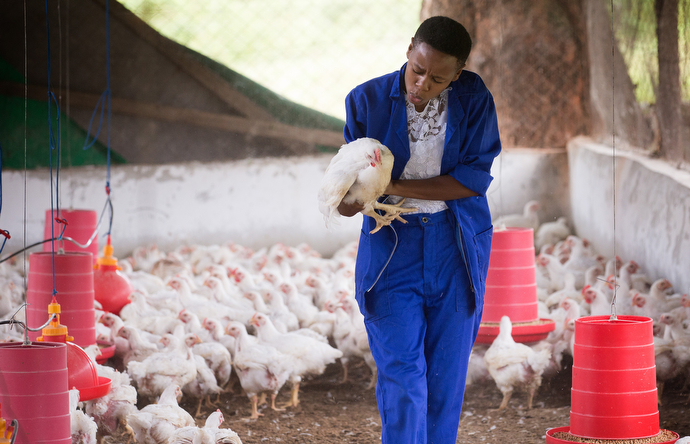
Agatha Muagura speaks softly to the chicken she has selected to slaughter as part of a training exercise at the Africa University farm in Mutare, Zimbabwe. Muagura, a freshman agriculture student from Mozambique, wants to be a farmer. Photo by Mike DuBose, UMNS.
Freshman Agatha Muagura whispers to the plump white chicken she is cradling in her arms. The bird is remarkably docile after being chased down, swung around by its feet and shoved on top of a scale for weighing.
Next lesson for Muagura — slaughtering and pulling out the innards. Next step for the chicken — Africa University dining hall.
Even though it is the end of the road for the chicken, really, until today, that chicken had a happy life.
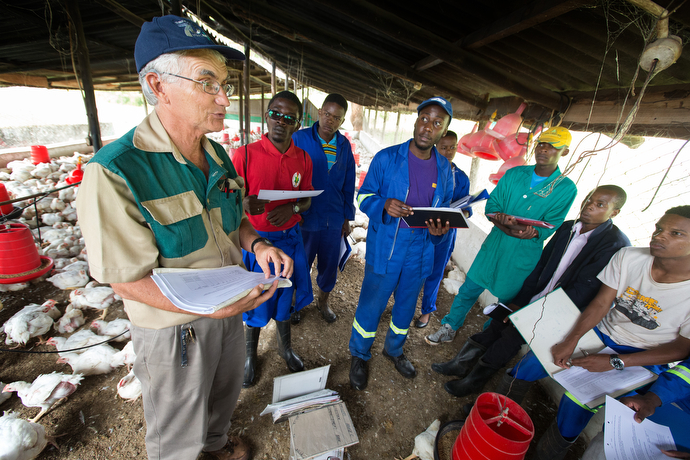
Larry Kies (left) leads agriculture students through a training exercise in the chicken house at the Africa University farm in Mutare, Zimbabwe. Kies, a United Methodist missionary, serves as the farm's technical adviser. Photo by Mike DuBose, UMNS.
On the more than 80-hectare (nearly 200 acres) Africa University farm, the chickens are content, the pigs and cows are fat and the crops are tall and bountiful.
Muagura, a first-year student from Mozambique, is one of eight students learning about farm work from Larry Kies, a United Methodist missionary with the denomination’s Board of Global Ministries, who has been an adviser and instructor to the farm since 2002.
It is chaos in the corner of the “mature” chicken coop. Giggling students corner cackling chickens. A lot of dust, feathers and other chicken by-products get kicked up.
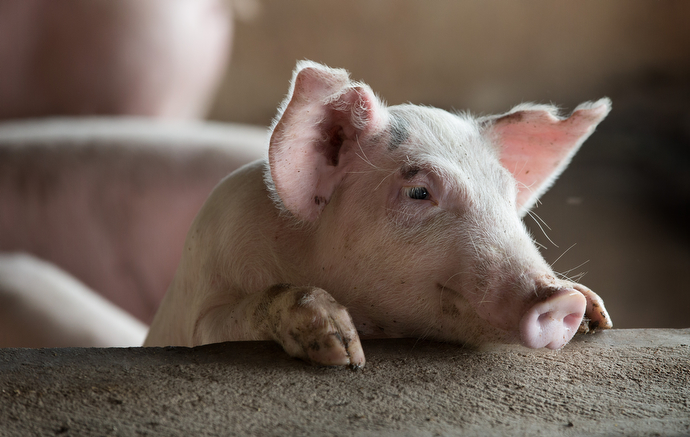
A pig peers over the top of its enclosure at the Africa University farm in Mutare, Zimbabwe. Photo by Mike DuBose, UMNS.
Unflappable Kies asks, “Do these look like happy chickens?”
After a pause, he answers, “They should, they are about to go to heaven.”
From day one to day 38, the chickens have a sweet life on the Africa University farm. Then, on day 38, they become part of campus life by way of the dining hall.
The Department of Agriculture and Natural Resources was established in 1992 as one of the first two faculties at this private, United Methodist-related institution. The farm provides chicken, beef and pork, eggs, dairy products and a wide range of vegetables to feed the students and staff. Leftovers are sold to restaurants and hotels in Mutare.
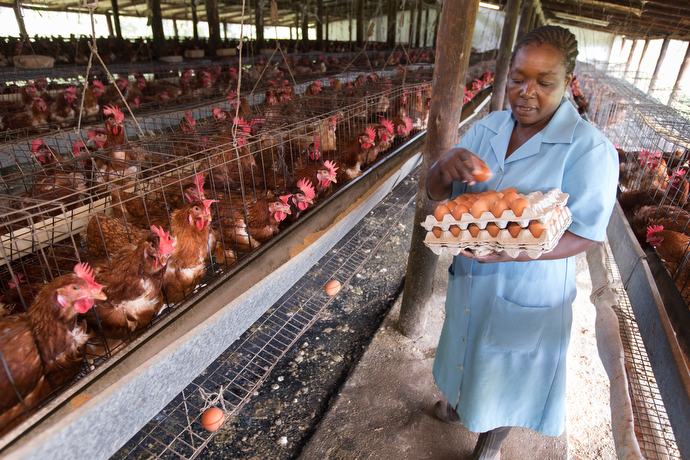
Naomie Chikosi gathers eggs at the Africa University farm in Mutare, Zimbabwe. Photo by Mike DuBose, UMNS.
Trevor Mupofu, the farm manager, said 300 birds go to the university kitchen every Monday, Wednesday and Friday.
The farm gets 2,000 one-day-old chicks every fortnight.
“Two thousand in, 2,000 out,” he says.
Soft fuzzy chicks come in peeping cardboard boxes with air holes. Each chick is counted and let loose in the first of three tin-roofed sheds where chickens live out their lives.
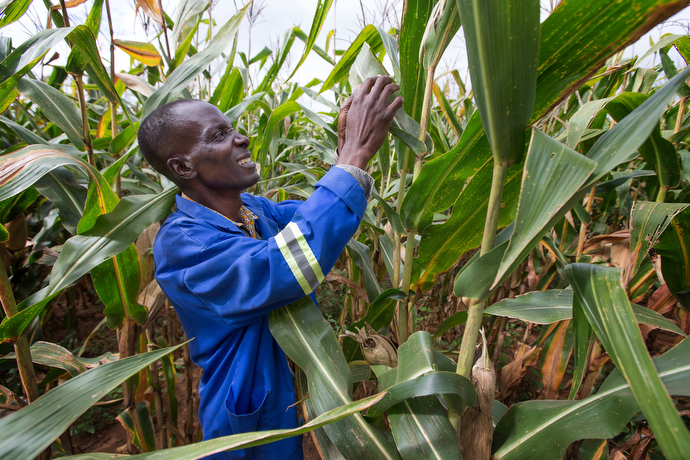
Robert Saundweme checks on the corn crop at the Africa University farm in Mutare, Zimbabwe. Photo by Mike DuBose, UMNS.
Mupofu says the chirping chicks come from 700 kilometers away. After their long, bumpy ride, they are “stressed out.” They get a special diet of vitamins mixed in with their feed to calm their nerves and get them on a healthy track, he says.
ways to donate
United Methodist churches can support the university through the Africa University Fund.
You can give online at any time or learn about specific campaigns and donation opportunities through the Africa University Development Office.
Scholarships for Africa University students are supported by Advance #3021028 through the United Methodist Board of Global Ministries.
Advance #3020619: Assists needy students enrolled at Africa University by providing for their basic needs.
Advance #3021027: Supports development of the AU farm to improve instruction for agriculture students and area farmers.
Africa University celebrated its 25th anniversary March 25-27
The white chickens are for eating, the red chickens are for laying.
Naomie Chikosi is the manager of one of the hen houses. She quietly walks between the wire cages dozens of times a day plucking eggs from the 3,000 laying hens. She sweeps and cleans the shed and waters and feeds her feathery brood. She fills crates with 50 eggs, 70 crates a day, 365 days a year.
She loves her job. Gazing at the wire cages, shyly, she says, “They are happy, hear them cooing. I just like them so much.”
Across from the chicken houses are three sheds of pigs. One for the general population, one for breeding and one for a maternity ward where baby pigs run around the feet of their moms.
Pigs stay in the first pen until they weigh 25 kilograms (about 55 pounds). Then they become either bacon or parents.
The staff keeps an eye on the female pigs who are receptive to breeding one or two days in a 21-day cycle. The male to female ratio is about one to 30, Mupofu says. In between their duties, the big males nap.
The university also has goats and sheep.
The farm grows everything from onions and leafy vegetables to potatoes and walls of maize. “We are known for our potatoes,” Mupofu says.
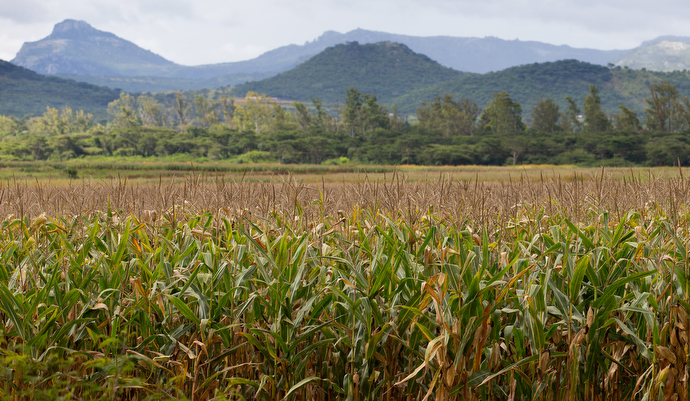
The farm at Africa University in Mutare, Zimbabwe, provides practical training for agriculture students as well as food for the campus dining hall. Photo by Mike DuBose, UMNS.
It’s not just the Africa University students who learn farming techniques here. The teaching farm is open to the community and other universities.
Mupofu’s office is in the first building constructed on the Africa University campus, a small round hut. He keeps the sparse office neat and clean.
“This is where the university started,” he says with some pride. “We have 38 people on our staff, I am number 38.”
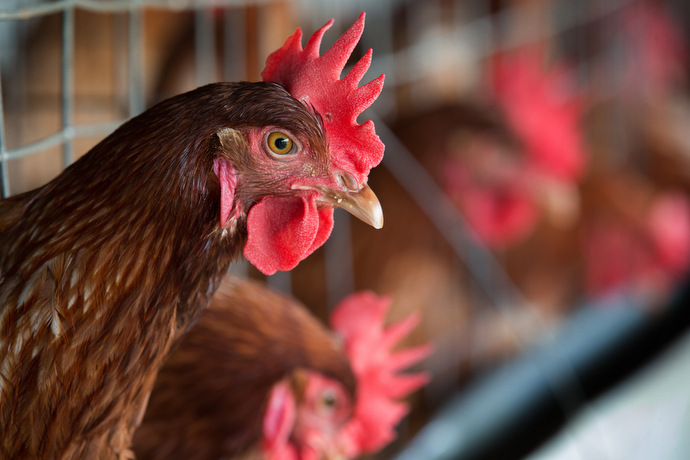
Chickens peer from their cages at the Africa University farm in Mutare, Zimbabwe. Photo by Mike DuBose, UMNS.
Gilbert is a multimedia news reporter for United Methodist News Service. Contact her at (615) 742-5470 or [email protected]. To read more United Methodist news, subscribe to the free Daily or Weekly Digests.
Like what you're reading? Support the ministry of UM News! Your support ensures the latest denominational news, dynamic stories and informative articles will continue to connect our global community. Make a tax-deductible donation at ResourceUMC.org/GiveUMCom.




